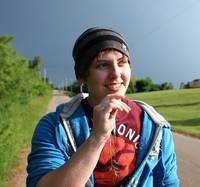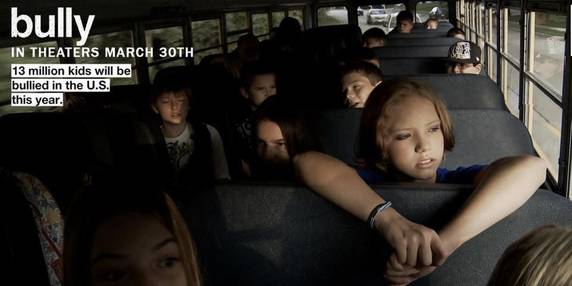 Weirdo. Pussy. Faggot. Lesbi-friends. Boys-will-be-boys. This is the lexicon of Bully, the documentary film playing at the Art Theater. The film follows several kids who are bullied and hears from parents of children who have taken their own lives as a result of the physical, but mostly mental abuse of classmates.
Weirdo. Pussy. Faggot. Lesbi-friends. Boys-will-be-boys. This is the lexicon of Bully, the documentary film playing at the Art Theater. The film follows several kids who are bullied and hears from parents of children who have taken their own lives as a result of the physical, but mostly mental abuse of classmates.
The film begins with David Long, a distraught father, describing his son, Tyler, 17, who committed suicide by hanging himself in his closet after years of bullying.
 It follows with Alex (left), 12, of Sioux City, Iowa, who is known as “Fishface” by kids in school. He’s bullied because he is different. Kids think he’s weird, and because he wants friends so badly, he’s willing to be punched, pushed around, stabbed by pencils, or have his head slammed into the seat of a school bus just to be accepted.
It follows with Alex (left), 12, of Sioux City, Iowa, who is known as “Fishface” by kids in school. He’s bullied because he is different. Kids think he’s weird, and because he wants friends so badly, he’s willing to be punched, pushed around, stabbed by pencils, or have his head slammed into the seat of a school bus just to be accepted.
 Then, there is Kelby (right), 16, a lesbian who came out in her small Oklahoma town and, consequently, faced daily abuse. Instead of moving away, she tries to change her small part of the world, to earn acceptance.
Then, there is Kelby (right), 16, a lesbian who came out in her small Oklahoma town and, consequently, faced daily abuse. Instead of moving away, she tries to change her small part of the world, to earn acceptance.
Ja’Meya, 14, of Yazoo County, Mississippi, was determined to stop the daily torment she received at school. She brought her mother’s gun on the bus, accumulating 44 felony counts and the potential for a life in prison.
Finally, there is Ty Smalley, 11, whose suicide motivates his parents to, at first, get on the Internet, and then start an organization called Stand for the Silent.
Bully is powerful, shocking, cruel, and sad. It’s astonishing also by the lack of responsibility that anyone feels for allowing bullying to happen. The assistant school principal in Alex’s school appears overwhelmed and incapable of dealing with the situation.
In fact, the bullying that Alex receives, filmed on the bus as though the introduction of a camera has no affect on young people’s behavior, begins as mundane young people chatter. “I will end you,” one bully says to Alex, and Alex, in his need for friends, takes it, smiles, and accepts it as friendship. The abuse escalates to choking and finally — later in the film — to his head being repeatedly smashed into the back of a bus seat.
What worries me the most is that, as appalling as this bullying is to adults, I wonder how mundane it must seem to young people who deal with this and other acts of abuse on a daily basis.

Bullying is an unfortunate part of growing up, and as a writer of young adult fiction, I see it as an unavoidable young adult experience. Every young person is the bullied, the bully, or the witness. Bullying is wrong.
I was bullied when I was younger, not because I was different or weird, but because I existed. Of the two bullies I knew, the first I met when I was in elementary school. He would push me around. When I actually listened to him, he started seeing me as a person, no longer as just someone to push around. Once that happened, bullying your “friend” just didn’t make sense to him. We weren’t close friends. We didn’t even play together. But at least my listening made him stop using me as a punching bag.
I met another bully in middle school. He intimidated me, took my gym shoes, and pushed me around. The harassment went on for months, as I remember it. It stopped only when he made the mistake of going after my best friend when we were sledding. He tackled my friend and started pummeling him. When that happened, I planted a boot in his stomach so far that it laid him out for five minutes. It motivated him to never bother me again.
The bullying of today seems so unlike anything I dealt with growing up. With social media, texting, and the like, the damage of one bully is magnified in untold ways. One scorned friend can ruin someone’s life.
I didn’t know the Ridge Farm, Illinois girl who hanged herself last year after reportedly being bullied in school, but her story shocks me. It sticks with me because the girl was ten years old. Ten. It’s incomprehensible.
Sure, maybe when you’re 13 and your hormones are raging … maybe when you’re desperately in love at age 15 and your parents don’t understand that the senior who asked you to prom really is the one. Or maybe even when you’re 17, gay, and stuck in a small town somewhere, hearing that “it gets better” doesn’t help in the now.
To kill yourself at ten, you know deep down in your heart that there’s something wrong. Maybe with kids, or society, or something unexplainable. Whatever the cause, this just should not happen.
Bully doesn’t solve the problem of bullying. That seems to be some of the criticisms I’ve read of the film. That it ought to tell people how to solve the issue. The movie does do that in subtle ways.
The film’s message is clear to me: Stop the abuse. If you see bullying in your school, say something, step in and defend those who can’t defend themselves. Parents need to be relentless in protecting their kids from bullies. Parents of bullies should do a better job of parenting. Schools and school administrators should be held more accountable in keeping children safe. And, the police should take bullying more seriously. Of course, that all sounds easy enough, but we know it’s not that way.
Bully is an important film if for no other reason than because it shines a light on a problem kids deal with daily.
The official Bully website has a toolkit for students, educators, and advocates. There’s also a downloadable “toolbox” of discussion strategies.
The Art Theater will show Bully on Monday (7:30 p.m.), Tuesday (7:30 p.m.), Wednesday (2:00 p.m.), and Thursday (7:30 p.m.).
All movie stills from the Bully Facebook page.








